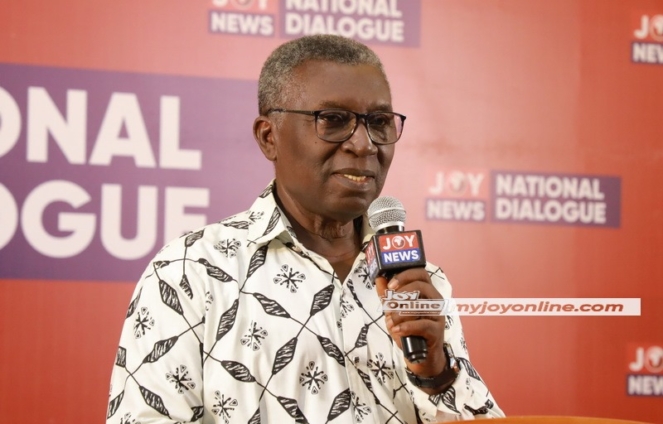Former Minister of Environment, Science, and Technology, Prof Boateng Frimpong, has expressed concern about the potential health risks associated with consuming vegetables cultivated in mining regions.
He emphasized the importance of implementing phytoremediation as a good practice, urging the Minister of Agriculture to consider this approach.

Prof Frimpong made these comments at the JoyNews National Dialogue on Illegal Mining held at the Labadi Beach Hotel in Accra.
Speaking on the theme ‘Exploring radical solutions to a national crisis,’ he explained that phytoremediation involves using green plants to eliminate poisons and toxic metals present in contaminated soil, thereby mitigating the harmful effects of pollutants.
"We need to plant certain things that will absorb or take out the poison in the body. So we know that if you plant sunflower, it will absorb magnesium and chromium. Cabbage and broccoli will take care of lead, zinc and cadmium so also water lettuce which will absorb cadmium, mercury, chromium and copper," he said.

He explained that the Minister of Agriculture should consider incorporating the phytoremediation strategy to preserve the soils as they continue to fight against illegal mining.
Prof Frimpong-Boateng advised residents in illegal mining regions to abstain from both cultivating and consuming vegetables, cautioning that doing so could lead to self-poisoning.

The former minister also disclosed that strategically venturing into affected areas and implementing this planting cycle will help reduce the toxicity levels in the soil over time, contributing to a gradual and sustainable improvement in the soil.

“We think the Minister of Agriculture should look at these things, as we fight illegal mining to go into areas where we can gradually absorb…we have to plant these in cycles. Maybe 10, 20 cycles so that the level of poison will come down.”
Latest Stories
-
Book Review – All’s Well (Feehi): Living a Life Guided by Grace by Abednego Okoe Feehi Amartey and Theodora Dame Adjin-Tettey
37 minutes -
French for health: A new initiative by French Embassy in Ghana
7 hours -
Ghana slowly retracing steps back to path of macroeconomic stability – Deloitte
7 hours -
Ghana’s debt service-to-revenue ratio reached all-time high of 127% in 2020, highest in SSA – IMF
7 hours -
Ghana’s consolidation efforts under IMF progamme to continue to be based on revenue
7 hours -
GPL 2024/25: Hearts beat 3-1 Chelsea to return to winning ways
8 hours -
Ghana set to host second Flag All-Star Game in Accra
9 hours -
Angor CREMA: Empowering Ghana’s coastal communities for sustainable growth
9 hours -
The Legon VC… and childhood memories
10 hours -
The absurd inequality of climate work: Overcoming dilemmas in the green transition
10 hours -
ORAL team receives first dossier of ¢500m National Service ghost names scandal
11 hours -
AfroFuture’s Culture Beach Jam comes off Dec. 28 & 29
11 hours -
NDC gov’t to address first quarter expenditure after January 7 – Ato Forson to Ghanaians
11 hours -
Man sentenced to 5 years for vandalism at Parliament
11 hours -
Art for development: Isaac Koney tells his story
12 hours

